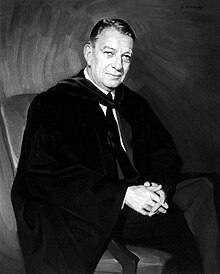Hardy Cross Dillard
| Hardy Cross Dillard | |
|---|---|
 |
|
| International Court of Justice | |
|
In office 1970–1979 |
|
| Nominated by | U.S. PCA Members:
|
| Preceded by | Philip Jessup |
| Succeeded by | Richard R. Baxter |
| Personal details | |
| Born |
October 23, 1902 New Orleans, Louisiana |
| Died | May 12, 1982 (aged 79) Charlottesville, Virginia |
| Nationality | US |
| Spouse(s) | Janet Gray Schaufler Valgerdur Nielsen Dent |
| Alma mater |
U.S. Military Academy University of Virginia |
Hardy Cross Dillard (23 October 1902 – 12 May 1982) was an American jurist who served as a judge on the International Court of Justice from 1970 to 1979, as a judge appointed by Queen Elizabeth II to a court of arbitration concerning the Beagle Channel islands dispute, Dean of the University of Virginia School of Law (1963–1968), legal adviser to the High Commissioner for Germany (1950), first Director of the National War College (1946), and as a Colonel in the U.S. Army during World War Two (1941–1946). During World War Two, Dillard served as Deputy Chief of Staff for Civil Affairs (G5) in the China Command, Commander of the Civil Affairs Staging Area at the Presidio of Monterey where he oversaw preparation and planning for the Occupation of Japan and as commander of the European Civil Affairs Training Division of SHAEF in preparation for Operation Overlord. Previously, he initiated and served as Director of the School of Military Government.
Hardy Cross Dillard was born the son of Avarene Lippincot Budd & James Hardy Dillard an educator who devoted his life to the education of African Americans and former Dean of Tulane University. Hardy Cross Dillard was also cousin of civil engineer Hardy Cross - originator of the Hardy Cross method. Dillard attended the Virginia Episcopal School and later the U.S. Military Academy where he graduated in 1924. Upon graduation, Dillard was commissioned a Second Lieutenant in the Infantry. However, with the First World War fading in to the background, Fresh West Point graduates were encouraged to leave the service. Thus, like many of his classmates, Dillard resigned his commission two months after graduation. He subsequently entered the University of Virginia Law School and served on the editorial board of the Virginia Law Review and was also president of the law school student body. Due to his legal ability, the law faculty took the unusual step of asking him to stay after graduation to serve as an instructor. He taught primarily international law for two years before leaving to become an Associate in the New York City law firm of Gregg & Church. After only a year with the law firm, he was awarded a fellowship by the Carnegie Endowment for International Peace to study international law at the University of Paris. Upon completion of the program, Dillard accepted an appointment as Assistant Professor of Law at the University of Virginia. He returned to New York City in the summers of 1932 and 1933 and worked as an associate at David, Polk, Wardwell, Gardiner and Reed. In 1934 he became the University's Director of Institute of Public Affairs an assignment in addition to his law duties. The Institute brought prominent speakers to the University from government, business and academia to discuss topics of national and international interest. As the Director, Dillard became acquainted with some of the leading figures of the day such as Senator Robert A. Taft, Supreme Court Justice Robert Jackson, Ambassador Paul V McNutt, Owen Lattimore, Thurman Arnold, Max Lerner, David Sarnoff, Rexford Guy Tugwell, Major George Fielding Eliot, Max Eastman, Quincy Howe, and William L. Shirer. Dillard, however, drew controversy by inviting communists such as Earl Browder to speak. A former president of the University's Alumni Association protested in a letter to the Alumni News that Dillard went "beyond freedom of speech" when he offered a rostrum from which the General Secretary of the American Communist Party and the Soviet Ambassador could, "spread subversive doctrines." Dillard responded that where controversial topics are selected, "both sides should be fairly heard." A spokesman for Germany was also invited to speak.
...
Wikipedia
